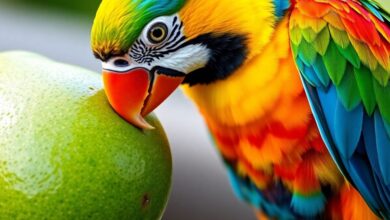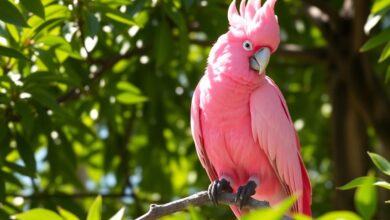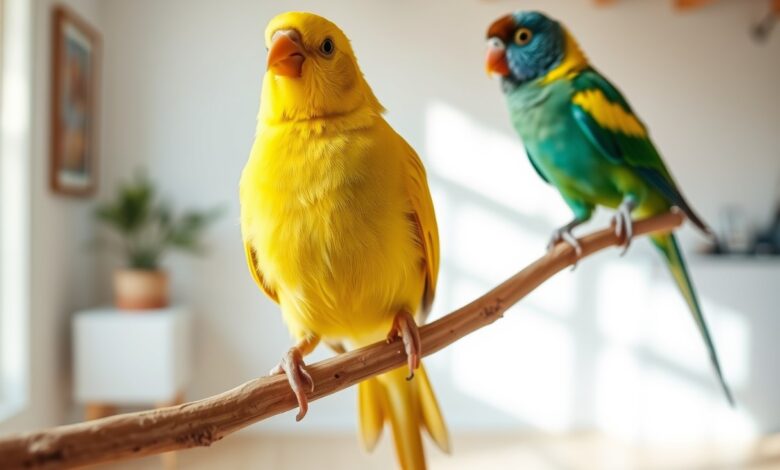
It’s crucial to consider various factors when deciding between a canary and a parakeet for your home. Both birds offer unique qualities and are popular pets, but they have distinct care and social needs. Canaries are known for their beautiful songs and require less interaction, making them ideal for those who prefer a more independent companion. In contrast, parakeets are social creatures that thrive on your attention and companionship. Understanding these differences will help you choose the right feathered friend for your lifestyle and preferences.
Key Takeaways:
- Size and Space: Canaries are generally larger than parakeets, which may impact their housing needs. Consider the space you have available.
- Social Needs: Parakeets are more social and enjoy interacting with their owners and other birds, while canaries tend to be more solitary and may require less interaction.
- Vocalization: Canaries are known for their singing abilities, making them great for those who enjoy music, whereas parakeets are more talkative and can learn words and phrases.
Understanding the Canary
A canary is a small, brightly colored bird known for its melodious singing. Originally bred for their vocal abilities, these birds are not only delightful pets but also come in a variety of colors and patterns. By understanding the specific needs and characteristics of canaries, you can determine if this enchanting species aligns with your lifestyle.
Physical Characteristics
Besides being small, typically ranging from 4.5 to 5.5 inches in length, canaries exhibit a vibrant range of colors including bright yellow, orange, white, and even green. Their bodies are slender with a robust frame, and they possess a distinctive round head and short tail, making them visually appealing.
Behavior and Personality
By nature, canaries are gentle and sociable birds. They prefer a calm environment and often exhibit less aggressive behavior compared to other pet birds. You will find them to be relatively independent, enjoying solo time in their cages, but they also respond well to gentle interaction.
Further, their gentle nature makes canaries excellent companions for those who appreciate a peaceful atmosphere in their home. They typically prefer isolated living over direct interaction with other birds and might become stressed in overly busy environments. Canaries will sing frequently, which can bring a joyful ambiance to your space. However, be mindful of their need for a quiet environment when they are adjusting to their new home, as any sudden noises or movements might make them feel threatened. Understanding these behavioral traits allows you to create a nurturing and safe habitat for your feathered friend.
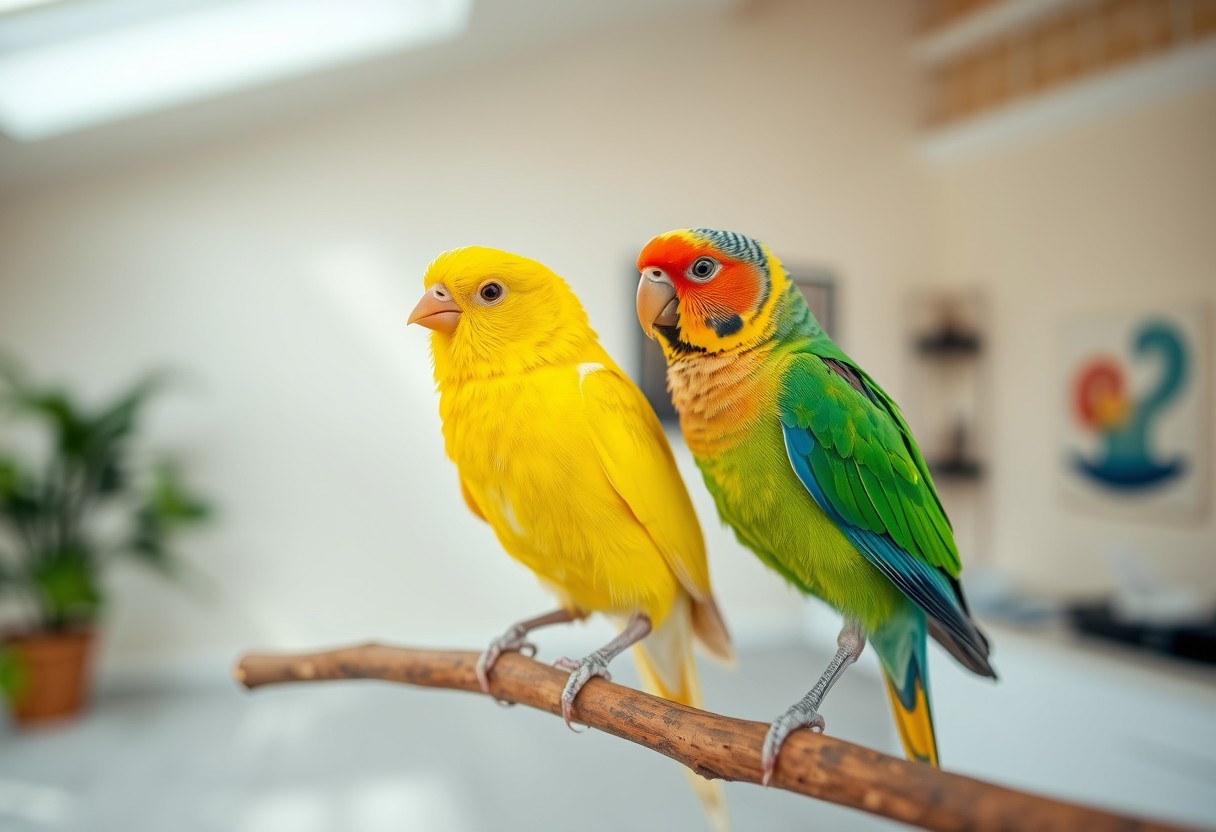
Exploring the Parakeet
Clearly, parakeets are charming and sociable birds that make wonderful companions for those seeking lively interaction. These small, colorful avians are known for their cheerful nature and can be a great addition to your home, providing not only beauty but also a delightful burst of personality.
Physical Characteristics
Above all, parakeets are recognized for their vibrant plumage and varied colors, which can include shades of green, blue, yellow, and white. Their slim bodies typically measure around 7 to 8 inches in length, and they possess a long, tapered tail that enhances their graceful appearance. Their medium-sized beaks are well-suited for seed cracking, making them ideal for those who enjoy feeding their feathered friends.
Behavior and Personality
On the whole, parakeets are known for their playful and affectionate demeanor, often forming strong bonds with their owners. They are highly social creatures that thrive on interaction, making them great pets for individuals or families who can dedicate time to engage with them. Beware, though, if left alone for extended periods, they may become bored or exhibit signs of distress.
At times, you may find that your parakeet develops a spirited personality, exhibiting curiosity and playfulness as it explores its environment. These birds are highly intelligent and may even learn to mimic sounds or words, adding to their charm. However, you should also be mindful of their tendency to become territorial when feeling threatened, leading to potential squabbles with other pets. Providing ample mental stimulation and companionship will foster a happy and well-adjusted parakeet, enhancing your overall experience as a bird owner.
Care Requirements
Now that you’ve decided to welcome a feathered friend into your home, it’s crucial to understand the care requirements for both canaries and parakeets. Each species has its own unique needs related to housing, diet, and environmental factors that are vital for their well-being. By knowing these details, you can ensure a happy and healthy life for your new companion.
Housing and Environment
Before you bring your bird home, make sure you have the correct housing set up. Canaries prefer a spacious, single-level cage with horizontal bars for climbing, while parakeets benefit from a tall cage that allows for more vertical flight. Ensure the cage is placed in a quiet area, away from drafts and direct sunlight, to provide a safe and comfortable environment.
Diet and Nutrition
Below the surface of care requirements, understanding the diet and nutrition of your bird is crucial for fostering good health. Canaries typically thrive on a diet of high-quality seed mix, supplemented with soft foods like fruits and vegetables. Parakeets, however, require a more varied diet that includes pellets, seeds, as well as greens and occasional treats. Your bird’s health can be jeopardized if you neglect their specific dietary needs.
In addition to seeds, your canary’s diet can include dark leafy greens, while parakeets benefit greatly from fresh fruits, such as apples and berries, to enrich their nutrition. Be cautious with avocado as it is highly toxic to both species. Providing a mix of vitamin-rich foods will not only keep your birds healthy but also support their plumage quality and vibrant colors. Regularly consult your veterinarian for personalized dietary advice to ensure your pet remains healthy and active.
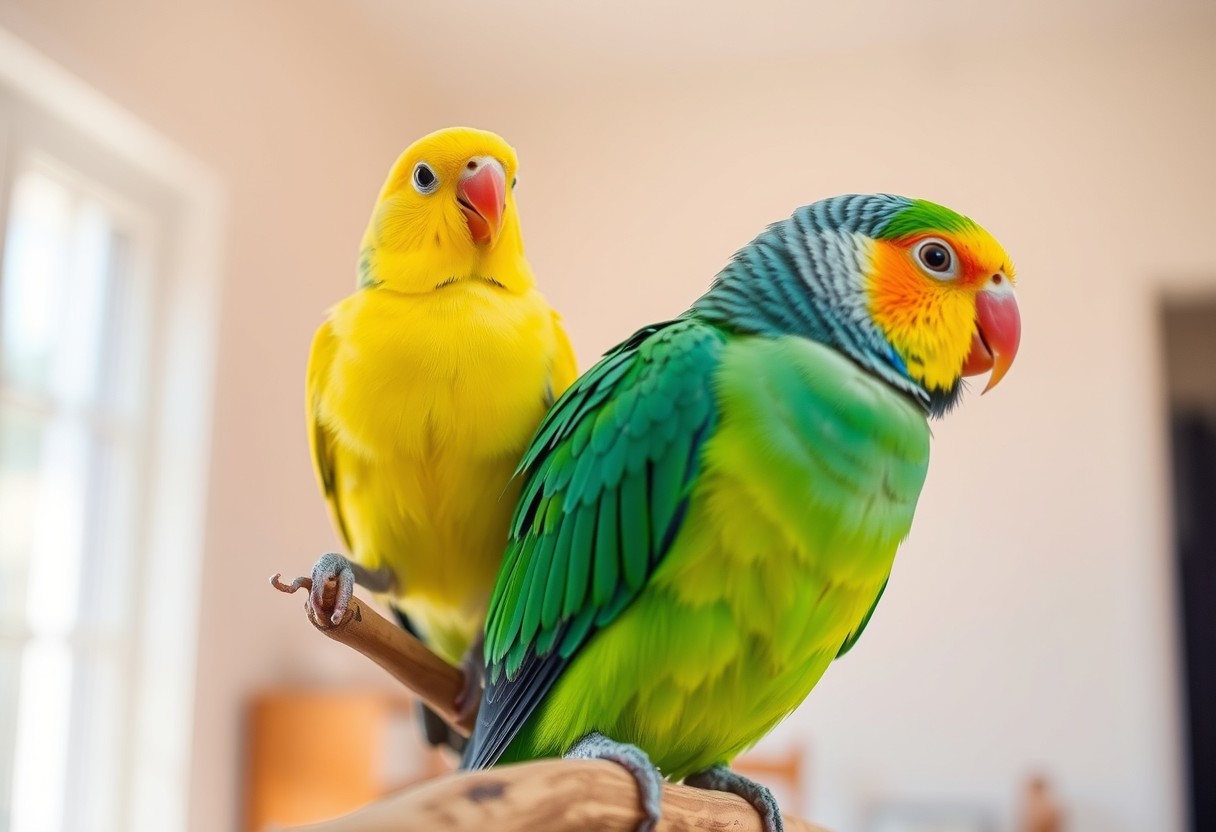
Socialization and Interaction
Once again, both canaries and parakeets offer different socialization experiences. While canaries are typically more solitary and enjoy singing rather than direct interaction, parakeets, known for their playful nature, thrive on human contact. If you’re contemplating between the two, you might find insights on Budgie or canary? : r/parrots, where bird owners share their experiences.
Need for Human Interaction
Above all, parakeets require regular interaction and environmental stimulation to remain happy and healthy. They are social birds that often bond closely with their owners, seeking attention and playtime. Canaries, on the other hand, manage quite well in solitude but enjoy being admired from afar.
Compatibility with Other Pets
Between canaries and parakeets, you’ll find that parakeets can often coexist peacefully with other pets, given proper introductions and monitoring. They are generally bold and curious, but introducing them to cats or dogs can pose risks. Always supervise their interactions to ensure the safety of all pets. On the contrary, canaries are more withdrawn and generally prefer to be in a safe, quiet environment away from other animals.
Also, when considering compatibility, it’s important to keep in mind that parakeets can become targets for other pets due to their small size. Training your dog or cat to respect your bird’s space is important. Always provide a secure cage and a safe area for your bird so they can feel protected. Good supervision can lead to a harmonious household with both your feathered and furry friends.
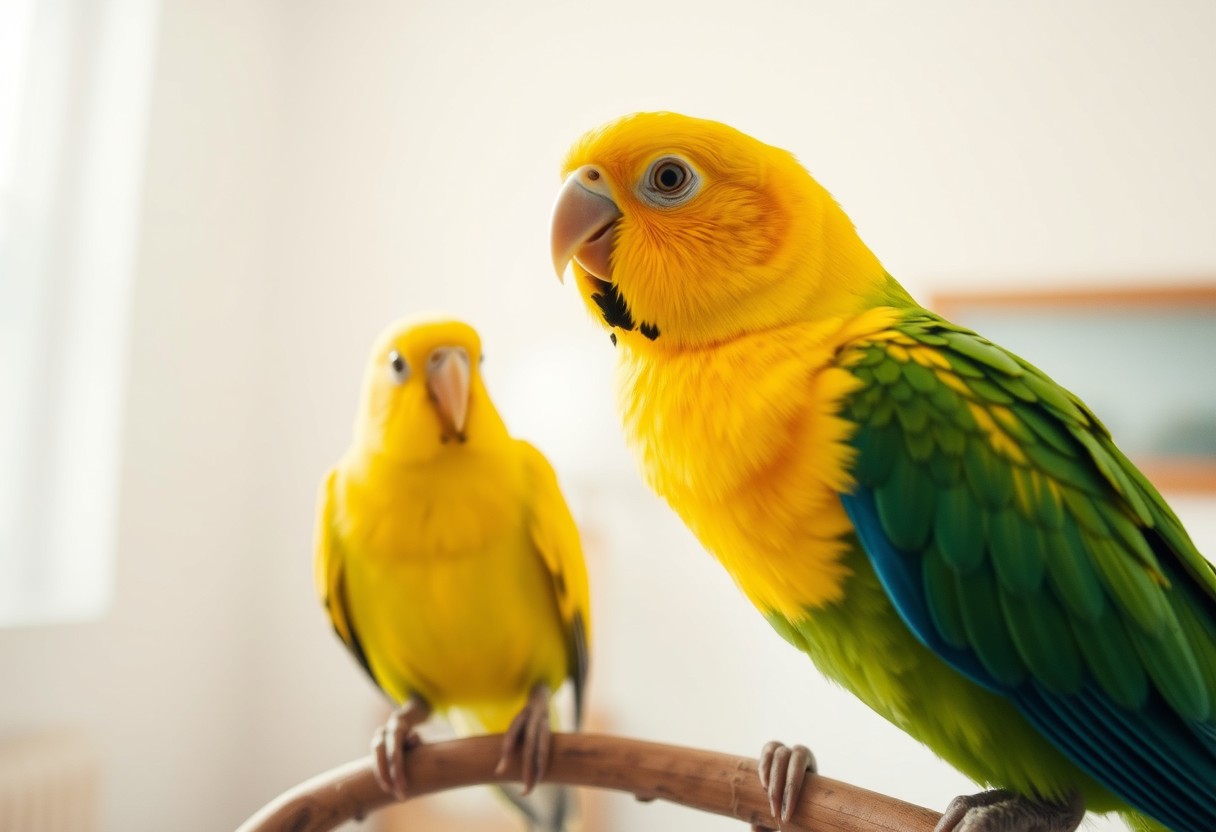
Health Considerations
Not all birds are created equal when it comes to health needs. It’s important to understand the distinct health considerations for canaries and parakeets, as certain factors may influence your choice. You can learn about the Difference Between Parakeets and Canaries to make a well-informed decision regarding their health care and potential issues.
Common Health Issues
Across both canaries and parakeets, you may encounter common health issues such as respiratory problems, feather plucking, and obesity. Keeping your bird’s environment clean, coupled with a balanced diet, can aid in preventing these concerns. Always monitor your feathered friend closely for any signs of illness that may prompt a vet visit.
Veterinary Care
One aspect of pet ownership you should prioritize is your bird’s veterinary care. Regular visits to an avian veterinarian can help detect potential health issues early and ensure your bird remains healthy.
This includes routine check-ups, vaccinations, and monitoring for signs of illnesses like psittacosis and tumors. A skilled avian vet can also provide guidance on diet and behavioral adjustments to promote a long and healthy life for your bird. Don’t hesitate to seek professional help if you notice any abnormal behavior or changes in your bird’s condition.
Cost of Ownership
Despite the differences in personality and care requirements between canaries and parakeets, the cost of ownership is an important aspect to consider. You can find detailed discussions on Canary vs. Lovebird | African Grey Parrot Boards – ProBoards for a nuanced understanding of costs associated with both options.
Initial Setup Costs
Below are some key components to consider for your initial setup costs. The costs can vary widely depending on the species you choose, the type of cage, accessories, and avian supplies such as food and toys. Typically, you can expect to spend around $100 to $250 at the outset.
Ongoing Expenses
To maintain your new feathered friend, it’s important to consider ongoing expenses. Regular purchases of food, periodic vet check-ups, new toys, and supplies can accumulate. Expect to budget anywhere from $20 to $50 a month, as needs can vary based on the species and their health.
And, while you can enjoy the companionship of either bird without breaking the bank, you should be aware that regular vet visits may lead to unexpected costs. Most birds need specialized care, and expenses may escalate if a health issue arises. Additionally, your bird may require specific diets and mental stimulation, resulting in recurring purchases of toys and treats. Proper budgeting ensures you can provide a healthy and fulfilling life for your pet.
To wrap up
Upon reflecting on your options between canaries and parakeets, it’s vital to consider your lifestyle, space, and preferences. Canaries are known for their beautiful songs and gentle demeanor, making them perfect for a serene home atmosphere. In contrast, parakeets offer engaging personalities and the ability to learn tricks, ideal for interactive pet owners. By assessing your needs and desires carefully, you can make an informed decision that ensures a fulfilling companionship with your chosen bird.
FAQ
Q: What are the main differences between canaries and parakeets in terms of temperaments?
A: Canaries are generally known for their solitary nature and sweet singing, making them more suitable for individuals who appreciate a quieter pet. They are not typically social birds and don’t usually enjoy handling. Parakeets, on the other hand, are highly social creatures that thrive on interaction with their owners and other birds. They are more playful and enjoy engaging activities, such as flying around and playing with toys. If you seek an interactive companion, a parakeet may be the better choice.
Q: How do the care requirements of canaries and parakeets differ?
A: The care requirements for these birds do have some differences. Canaries require a clean environment with ample space to fly, but their need for interaction is minimal compared to parakeets. Canaries are fed primarily a seed-based diet supplemented with fresh fruits and vegetables. Parakeets need a more varied diet that includes seeds, pellets, and fresh produce. Additionally, parakeets often require more socialization and playtime outside of their cage, whereas canaries can be relatively independent. Be sure to assess your lifestyle and the time you can dedicate to your pet when choosing between the two.
Q: Which bird is easier to train, a canary or a parakeet?
A: Parakeets are generally easier to train than canaries. They can learn tricks, mimic sounds, and even develop a vocabulary with consistent training and interaction. Their social nature makes them more receptive to bonding with their owners, which aids in the training process. Canaries, on the other hand, are less inclined to respond to training and are primarily appreciated for their beautiful singing rather than interactive behaviors. If you’re interested in training your pet and teaching it tricks, a parakeet would be a better fit for that purpose.



